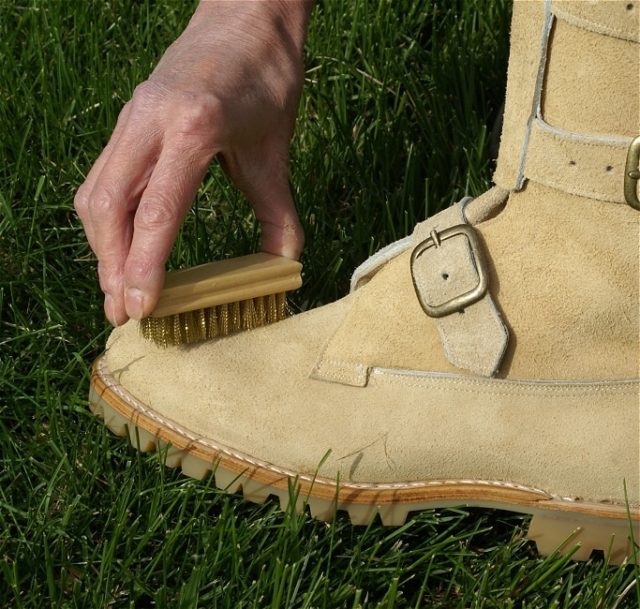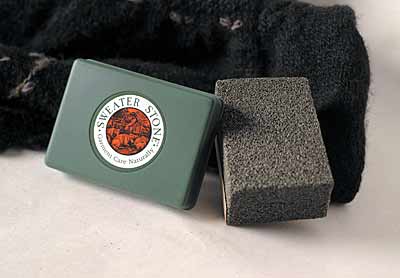Ask Allie: How to Clean Suede, Sweat Stains, and Care for Fabrics
What is the best way to clean suede shoes? I have a pair of teal suede wedges that I adore but that are looking a little rough. The teal is very bright and I don't want it to fade. Any suggestions?
1. Get thee a suede-cleaning kit! Suede cleaning kits can be found at most big-box retailers (and I found this one on Amazon
). Kits will have the basic tools you need to clean and protect your suede footwear. The two most important parts of these kits are the suede brush and the suede eraser.

A suede brush is not a typical brush – some have various types of bristles, some only come with one type of bristle. However all have fine metal bristles that will help remove stains and maintain the nap of the suede. Brush in one direction to pull up dirt and restore the look of your suede.
A suede eraser is not your typical pencil eraser – it will crumble while being used, but those crumbles will grab all the dirt and debris lurking in your suede’s nap.
2. Fight water with water. If your suede is stained from water, take a spray bottle of plain water and spray evenly over the entire shoe. Blot dry with a cloth, stuff the shoe with paper to maintain the shape, and let air dry. Your shoes will end up a slightly darker color, but will no longer have the water spot.
3. Rough it up. Suede shoes often end up with shiny spots from wear. A suede brush can help rough up the nap, but sometimes you need a bit more help – use a fine grade of sandpaper
and it should help make your shoes look even.
4. Erase it away. Small spots can often be removed with a classic red eraser. If your suede is a light color, consider a white art gum eraser
. Again, brush the suede afterwards to restore the nap.
5. DIY at your own risk. Looking online I found all sorts of DIY methods for cleaning suede. Many people claim to find shaving cream as good of a suede cleaner as the kits sold at mass retailers and shoe repair shops. If you decide to go this route, test in an inconspicuous location on the shoe before proceeding.
Many people find a new nail brush to be a quick fix when you do not have a proper suede brush. As with a suede brush, only brush in one direction to prevent shine.
I'd love if you could do a post on caring for fabrics. How do you handle armpit stains on white shirts? What about pilling on synthetic fabrics or cashmere? How do you know when a garment has reached the end of its useful life?
Sweat Stains
It’s funny, I don’t really own that many white shirts any more so I haven’t dealt with this in a long time. I can remember soaking shirts in a slurry of Oxiclean and hot water for days before washing with bleach. Usually I would just donate the shirt and move on.
However these days I wish to have my clothes last a long time, and don’t want to fill landfills with my pit stains. I have done some research lately and here’s some suggestions I have found:
1. Relieve the pain. Dissolve two standard aspirin in one cup of hot water. Apply to the stains and let soak. Then wash as usual.
When researching this, I found an alternative to this recipe which requires three aspirin tablets, one tablespoon of Cream of Tartar
, and a cup of warm water. Scrub into fabric with a toothbrush, let sit for a half an hour (or even overnight) and then launder as usual.
2. Let it bake. As a cloth diapering mom, I have found the ultimate best stain remover on this planet – the sun. It seems too easy to work, but leaving items stained by human protein or waste can get back to being snowy white with some hours soaking up the rays. Dampen the item and place in direct sunlight (a windowsill can work, though not as quickly). This may not work in one sitting, but a couple days of re-wetting and line drying in the sun can work wonders on sweat stains.
3. Don’t bleach. Bleach seems like a good idea, but chlorine reacts with the proteins in sweat, and can cause the stains to become even darker. Better to use an oxygen cleaner or hydrogen peroxide.
4. Try an enzyme fighter. I always have a bottle of Bac-out in my laundry room. It smells delicious (like lime lollypops), it’s gentle to the earth, and it’s a workhorse. I found out about it from cloth diapering, but I use it for all sorts of stains. Works especially well on protein stains. I will saturate the spot, rub it or brush it with a toothbrush if the fabric can handle it, let it soak overnight and then launder as usual.
Pilling Sweaters
I have a sweater stone, and a sweater shaver
and love both of them.

A sweater stone can make quite a mess, but you never are searching for AA batteries five minutes before you have to leave for work. It does a great job on large areas – I will take my stone to any thrifted sweaters that are looking old and sad.
Green tip: Don’t toss your sweater lint into the trash – if you compost, stick it in your compost pile; if not leave it out on a deck or balcony and a bird will happily take it to fluff his nest!
A sweater shaver is better for more precise pill-removal and for small spots. Be careful, a snag can not only jam the motor of a sweater shaver, but the shaver could nip the thread causing a hole or run in your knits.
Pilling Polyester
I hate when this happens, and I have yet to find a good solution. Both the sweater shaver and sweater stone can cause even more damage to synthetic materials like polyester. Usually I see pilling of such fabrics as a time for the item to be retired.
If it’s a small location, you can try using a standard razor for the body (choose a blade sans moisturizing strip). Do in a well-lit area and pad the fabric underneath so you only shave off the pill and not nick the fabric.
The best way to prevent pills on synthetics is to baby them. Launder them inside-out, launder only with like fabrics, use liquid detergent and line dry.
When It’s Time to End the Relationship
Sometimes, no matter how you baby a garment, it’s just time to let go. I find it’s time when it just LOOKS old – the color is faded, it’s covered with pills, the fabric is thin in places, the stains won’t go no matter what you do. I find with white shirts it’s time to make them rags when they are just too soft to keep their shape, even when ironing with starch.
Green tip: Don’t toss those ratty tee shirts, oxfords, and knit dresses. Make them into cleaning cloths! No need to hem the edges, just cut into squares that are best for your needs (I like a 12” square or so). Knits are great for dusting, flannel is a wonderful choice for wiping PB&J hands of toddlers (or washing your face), soft well-worn cotton ends up being lint-free and can make for a good rag when cleaning glass.


![Spring Cleaning the Wardrobe with eBay 22 Spring Cleaning the Wardrobe with eBay [Sponsored]](https://www.wardrobeoxygen.com/wp-content/uploads/2017/04/spring-cleaning-your-closet-with-eBay-Wardrobe-Oxygen.jpg)




Wow, thanks so much for the tip! Will try this!
I used to work at a dry cleaner (years ago) and for polyester pill removal we had a thin folded strip of just the hook portion (the sticky side) of velcro in a little hand type holder. Worked wonders. I still use this (just fold the velcro) and run it gently over the pilled area.
Great tips! My new sandals have light beige suede platforms, so I’m sure they will need cleaning before the summer is out.
I haven’t done that in a while, it feels good to get back into the habit!
Baking soda is amazing! I don’t buy cleaning products anymore, I get it all done with Dr. Bronner’s, vinegar and baking soda!
Yep, still using knitted cloths and sponges from Etsy and they are great. Don’t foam up as much but know everything is getting spic & span and I can then throw them in the wash or dishwasher to sterilize!
I love your eco tips 🙂 I also read a long long time ago on your blog your were using knitted cloths for washing dishes. I was wondering how is that working out?
And here’s another indispensable all purpose item: baking soda. This wonderful cleaning agent removes calcium deposits in your sink, works on variety of stains, like fruit stains and blood. I also use it to clean my silver jewellery. And in a pinch it can be a wonderful substitute for toothpaste.
Great tips! I also like how you included some green stuff 🙂